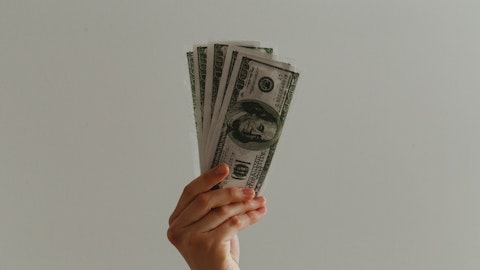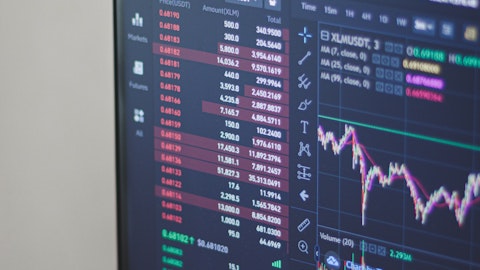In this article, we will take a look at the 5 stocks most affected by inflation. If you want to see more stocks in this selection, go to the 10 Stocks Most Affected by Inflation.
5. Pool Corporation (NASDAQ:POOL)
Number of Hedge Fund Holders: 42
Pool Corporation (NASDAQ:POOL) is a Louisiana-based distributor of equipment and supplies for swimming pools along with other leisure products. The company has the distinction of distributing over 200,000 national brand and private label products belonging to over 2,200 vendors to nearly 120,000 wholesale customers as of 2022. This makes the company the biggest distributor of swimming pool-related wholesale products in the world, as it primarily caters to the needs of residential customers.
Pool Corporation (NASDAQ:POOL) was one of the beneficiaries of the COVID-19 pandemic, as lockdowns and restrictions limited the movement of people and caused them to shift their focus to recreational activities like swimming. However, the uncertainty in the macroeconomic environment due to rising inflation rates has led to a sharp decline in the discretionary spending of customers, adversely impacting the demand for Pool Corporation’s (NASDAQ:POOL) products. Furthermore, employees are now getting called back to full-time work, which is also not playing in Pool Corporation’s (NASDAQ:POOL) favor. The management anticipates Q4 2022 gross margin to decline by 1.5%-2% in comparison to the last year and has also lowered the full-year earnings guidance.
Here’s what RiverPark Funds said about Pool Corporation (NASDAQ:POOL) in its Q2 2022 investor letter:
“Those of you who own a backyard pool already know the Pool Corp. story quite well. (Honey, why is the pool water green?) Those who don’t own a pool, well, we recommend a little rent-seeking on your neighbor’s pool by owning these shares. The Pool Corp. strategy is beautifully simple; build a pool and become its customer for life. Once the major discretionary expenditure of building a pool is made, that high-maintenance asset becomes an annual annuity for your local pool service company. Increasingly, that local pool service company could well be owned by Pool Corp.
Those who own older pools know quite well that pool maintenance is much more involved (read: expensive) than just annual chemicals in the early years. Once a pool reaches its early teen years (often sooner), maintenance reaches a very different level of (read: expensive) when every part of the pool’s filtration system wears out. As the years progress, then pool/backyard rebuild kicks off. Well, that original pool becomes a brand-new second pool. Rinse and repeat. Your local pool service company is assuredly not the lonely Maytag repairman…” (Click here to see the full text)
Follow Pool Corp (NASDAQ:POOL)
Follow Pool Corp (NASDAQ:POOL)
Receive real-time insider trading and news alerts
4. The Boeing Company (NYSE:BA)
Number of Hedge Fund Holders: 42
The Boeing Company (NYSE:BA) is an Arlington, Virginia-based aerospace and defense company that is known for manufacturing commercial airplanes.
Inflation and supply chain-related challenges caused the aerospace giant to report a loss of $3.3 billion during Q3 2022. The Boeing Company (NYSE:BA) noted that it observed the heaviest impact on its financial statements from defense plane contracts. These are government contracts based on fixed price points which caused the company to take a financial hit in completing them during an inflationary environment. The inability to pass on the price increases did not play in favor of The Boeing Company (NYSE:BA).
Furthermore, the company lost hundreds of experienced engineers from its workforce as employees decided to take early retirements in 2022. This was done to cash out pensions as employees feared that an increase in inflation could cause a big cut in their pension payouts if they delayed the decision to retire.
Here’s what Meridian Funds said about The Boeing Company (NYSE:BA) in its Q3 2022 investor letter:
“We similarly remained invested in largely out-of-favor The Boeing Company (NYSE:BA) , a global leader in developing and producing commercial jet aircraft. Due to some self-inflicted wounds and a bit of bad luck, as well as dramatic declines in air travel early in the pandemic, investor sentiment for this company has simply been awful. As part of our contrarian thinking, however, we view the business as critical to global transportation needs and see multiple catalysts to improve sentiment. In addition to the current surge in air travel worldwide, ramped up production of the 737 MAX aircraft and the pending restart of 787 Dreamliner deliveries should help turn broader sentiment. Additionally, we anticipate a meaningful inflection in cash flow as Boeing starts delivering aircraft currently in storage as well as the eventual expansion of its production in both core platforms.”
Follow Boeing Co (NYSE:BA)
Follow Boeing Co (NYSE:BA)
Receive real-time insider trading and news alerts
3. The Procter & Gamble Company (NYSE:PG)
Number of Hedge Fund Holders: 69
The Procter & Gamble Company (NYSE:PG) is a Cincinnati, Ohio-based manufacturer and marketer of fast-moving consumer goods (FMCG).
For the fiscal year 2023, The Procter & Gamble Company (NYSE:PG) is predicted to experience about $3.9 billion in headwinds, or a 27% reduction in EPS growth, as a result of rampant inflation affecting consumer finances, geopolitical problems, and exchange rate fluctuations. The Procter & Gamble Company (NYSE:PG) was anticipating a net headwind of $2.3 billion, or a 16% reduction in EPS growth, compared to the comparable projection provided in Q3 2022. However, the forecasted headwind for 2023 has risen by 69%. The rising inflation rates have also led many customers to switch to other brands. According to the latest survey conducted by Chicago, Illinois-based management consultancy firm Kearney only 22% of the customers are loyal to their favorite brands.
As of Q3 2022, The Procter & Gamble Company (NYSE:PG) was held by 69 hedge funds.
Follow Procter & Gamble Co (NYSE:PG)
Follow Procter & Gamble Co (NYSE:PG)
Receive real-time insider trading and news alerts
2. PepsiCo, Inc. (NASDAQ:PEP)
Number of Hedge Fund Holders: 72
PepsiCo, Inc. (NASDAQ:PEP) is a Harrison, New York-based manufacturer, distributor, and marketer of beverages and snacks.
Due to rising inflation, PepsiCo, Inc. (NASDAQ:PEP) has been forced to cut down hundreds of jobs to improve efficiency and lower costs. The snack segment of the business has initiated a voluntary retirement program in the states of Illinois and Texas. Although the sales of snack divisions increased by 16% YoY during Q3 2022, the growth was driven due to a 17% rise in prices. This reflects that unit sales observed a YoY decline. PepsiCo, Inc. (NASDAQ:PEP) has been able to increase prices and pass on the impact of inflation to consumers due to its strong brand image.
PepsiCo, Inc. (NASDAQ:PEP) was held by 72 hedge funds at the end of the third quarter of the year.
Follow Pepsico Inc (NASDAQ:PEP)
Follow Pepsico Inc (NASDAQ:PEP)
Receive real-time insider trading and news alerts
1. Tesla, Inc. (NASDAQ:TSLA)
Number of Hedge Fund Holders: 88
Tesla, Inc. (NASDAQ:TSLA) is a Texas-based manufacturer of electric vehicles helmed by the billionaire Elon Musk.
Earlier this year, CEO Elon Musk accepted that Tesla, Inc. (NASDAQ:TSLA) is bearing a significant impact of inflation in the form of higher raw materials costs and logistical expenses. Tesla, Inc. (NASDAQ:TSLA) reported that vehicle sales in November 2022 declined by 9.5% YoY compared to 2021. This is the first time since 2008 that the company’s vehicle sales declined for two consecutive months on a month-over-month (MoM) basis. Historically, October and November have been considered the strongest months for automobile sales. Tesla, Inc. (NASDAQ:TSLA) might have to bear the pain on multiple fronts as experts believe that the company could be forced to take further price cuts to address its low demand problem. During the inflationary period, Tesla, Inc. (NASDAQ:TSLA) has been forced to cut its prices in China and the US along with production cuts in China due to rising costs.
Here’s what Baron Funds said about Tesla, Inc. (NASDAQ:TSLA) in its Q3 2022 investor letter:
“Tesla, Inc. (NASDAQ:TSLA) makes fully electric vehicles (EVs), related software offerings, solar and energy storage products, and battery cells. After a tough second quarter that included a prolonged shutdown of one of Tesla’s key manufacturing facilities in Shanghai, the company demonstrated a significant 40% sequential increase in production volumes resulting in another quarterly record of production and deliveries. Despite the second quarter complexities, inflationary pressures, and production ramp-up of two new facilities (Berlin and Austin), the company exceeded Wall Street expectations in the second quarter. It maintained healthy 26% normalized gross margins, achieved industry-leading 18% adjusted operating income margins, and has generated over $14 billion of cash from operations over the past year. Moreover, due to Tesla’s high level of vertical integration and U.S. manufacturing capacity, the company is expected to be one of the key beneficiaries of the Inflation Reduction Act, qualifying for significant manufacturing and consumer-related incentives. We believe these incentives can add up to tens of billions of dollars over the coming decade, while also enhancing Tesla’s competitive advantage versus other automakers. The company also held its second artificial intelligence day, which presented continued advancements in its vehicle self-driving program and showcased its rapidly evolving humanoid robot developments (check out the Optimus videos on YouTube). We continue to believe Tesla is well positioned to benefit from complementary tectonic shifts in the automotive industry, including electrification, autonomous driving, and shared mobility. And, yes, Tesla is still effectively debt free, with over $18 billion of cash on its balance sheet, and investors are even speculating about a stock buyback, a far cry from worries of bankruptcy just a few years ago.”
Follow Tesla Inc. (NASDAQ:TSLA)
Follow Tesla Inc. (NASDAQ:TSLA)
Receive real-time insider trading and news alerts
You can also take a peek at the 11 Undervalued Canadian Stocks To Buy and 10 Best December Dividend Stocks To Buy.





